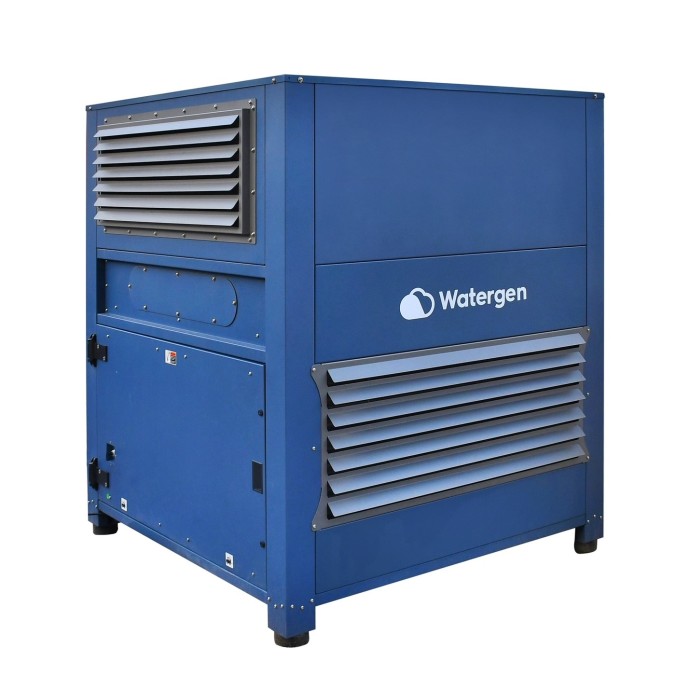"Unlike companies and other methods that harm the environment, we do not waste this precious resource," the company emphasized.
"Water shortages are not only a problem for countries on the African continent, but also for the United States, Spain, China, Japan, Australia and many advanced countries - there is a lack of resources that are disappearing," emphasizes Michael Rutman, Co-CEO of the Israeli company Watergen, which owns a unique patent that allows it to produce quality drinking water from the air, for domestic or commercial needs.
Founded in 2009, Watergen has become a global leader in the atmospheric drinking water device market (AWG), which produces drinking water from the air. The company's solutions make it possible to provide a cost-effective solution to the global shortage of drinking water and make it possible to eliminate the supply chains that are harmful to the environment.
The company was the exclusive water supplier for the Jerusalem Post London Conference held in conjunction with UK Israel Business at the Tottenham Hotspur Stadium in London last Thursday. The conference dealt with the global fight against antisemitism, the challenges of the Jewish world, and the creation of new business opportunities through innovation, tolerance and sports.
Initially, the company focused on its unique product, which was a heat exchanger made of a special polymer, which made it more efficient for use in products such as air dryers or tumble dryers. After being acquired by Israeli businessman Michael Mirilashvili in 2016, the company began to focus on a new vision. "The company's developers developed a heat exchanger that provided a huge advantage - the ability to dry the air with the highest energy efficiency in the world," Rutman recalls. "From the moment Mr. Mirilashvili took over, the company changed its essence - his vision is that everyone in the world should have access to drinking water.
"Approximately 85 percent of the disease in the world is due to poor water sanitation," adds Rutman. "In general, sick people are less productive, and therefore the quality of water directly affects the country's economy. What sets us apart is that, unlike other companies, which use desalination, for example, we do not touch and deplete this precious resource called water. On the contrary - we add water to the world, unlike desalination, which destroys the sea and the environment. "
In 2016, the company established the most advanced laboratory in the Middle East for water research, opened collaborations with universities and research institutions, and began developing its products. Today it operates in three main verticals with smart products that are easy to install and operate. The first is designed for home or office use to replace the standard water source. The second vertical is the commercial space and features devices with a substantial capacity for residential buildings, hospitals, universities and more. The company's products include the GENNY HOME, with a capacity of up to 18 liters per day, the GENNY, which can produce up to 30 liters daily, the GEN-M1, which can produce 220 liters, the GEN-M Pro, with a capacity of 1,000 liters, and the GEN-L which can produce 6,000 liters daily. In addition, there is the Mobile Box, a portable device that provides up to 20 liters a day.

The third sector to which they are turning is the automotive world. "Vehicles need water," Rutman explains. "We work with most major manufacturers to integrate our devices into vehicles. "Another feature that they want, and that we can provide, is the ability to drink water in the vehicle, and this is already opening up new markets for us, such as buses, caravans, trains and ships - all transportation by land and sea."
Rutman emphasizes that the company's products provide a solution to another acute problem of the 21st century, which is pollution. "When you use Watergen water, you do not have to use packaging or transport, and we also save on the use of plastic, and reduce pollution during transport, because the product produces the water on the spot."
It is important to emphasize that the water quality produced by Watergen products is of the highest quality and enriched with all the required minerals, and undergoes rigorous testing at the company's laboratory. Water quality is not always maintained in the transportation systems that exist today.
"There is a problem of infrastructure," Rutman points out. "In developed countries, people only drink from bottles. In New York, for example, water in about 80 percent of schools is unfit for drinking because of the old infrastructure that causes poor water quality at its exit points."
The company's unique and groundbreaking technology has gained no small amount of worldwide recognition - it has twice won the Innovation Award at CES 'prestigious exhibition in Las Vegas, starred in Time Magazine's list of 100 most important inventions, and was named as one of the eight most important inventions in Israel by the Chamber of Commerce and Industry, alongside giants like Iron Dome and Mobileye.
The company currently operates in more than 80 countries around the world, including the United Arab Emirates, and is even active in the Gaza Strip. This is in addition to research collaborations with academic institutions such as Ben-Gurion University, Tel Aviv University and the Institute for Water Research that opened in Abu Dhabi. "We are investing a great deal of research money to bring the next generation of technology - a product that will work on renewable energy only and can produce water anywhere. In the coming years, we will increase energy efficiency ten-fold and penetrate heavy industries like the worlds of agriculture and renewable energy."
Translated by Alan Rosenbaum
